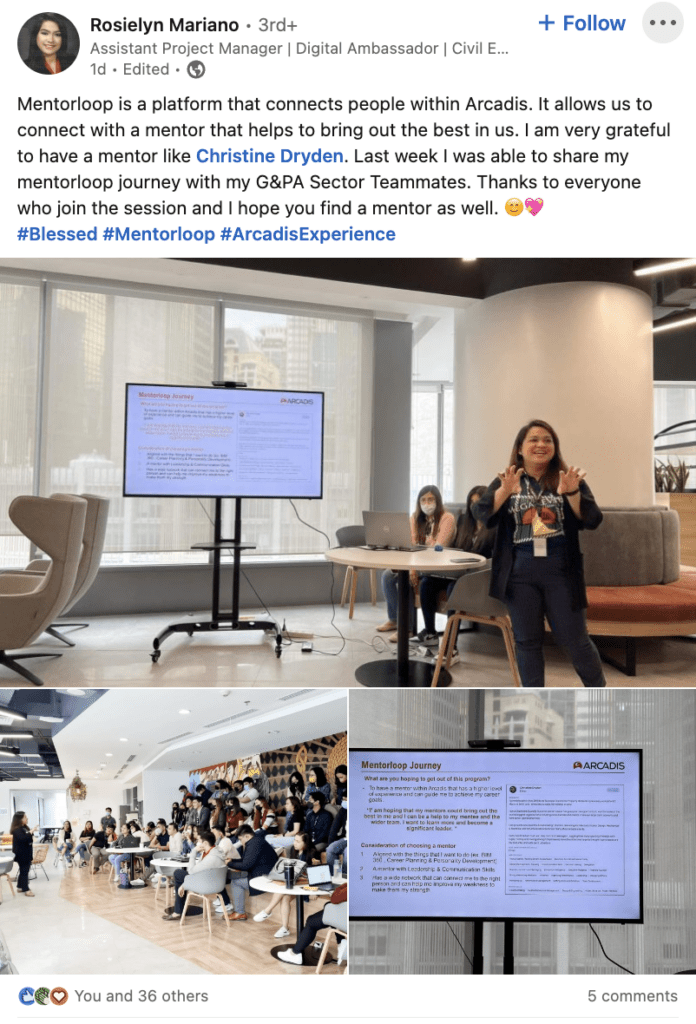After facilitating over 100,000+ mentoring matches, we’ve seen the highs and lows of mentoring relationships. Sometimes people lose interest. They don’t sustain their relationships. There are obvious and not-so-obvious reasons for mentoring relationships to stall.
So, we’ve collated 5 tried-and-tested ways to revive a mentoring relationship that has stalled. Depending on the style of your mentoring relationship, you might wish to tackle one or all of these:
How to Save a Mentoring Relationship That Has Stalled
1. Rediscover that all-important ‘drive’
This one is about motivation, or knowing your ‘why’ (not anyone else’s). It’s easier to be enthusiastic when you know what drives you and what you want. It also makes it easier to set goals – if you’re already a gun at this, congratulations! Head on to step 2.
Sometimes it can be difficult to maintain your motivation or drive once the initial spark of enthusiasm has faded. But it is important to remind yourself that it was this desire to accomplish something that brought the two of you together in the first place. Rediscovering this shared drive is the key to restoring a stalled mentoring relationship. Better yet, having a shared drive to reach a specific goal can be even more powerful in a mentoring relationship.
Remember that mentoring is a two-way street. It’s just as important for a mentor to be just as motivated to help the mentee reach their goal as the mentee is to reach it. So work on matching one another’s energy and return what enthusiasm is brought to the relationship, with your own.
Mentors: By now you’ve already gotten to know your mentee. It’s time to poke around, help them discover their purpose, their ikigai*, their passions.
(*What’s an ikigai I hear you say – it’s a Japanese concept that looks at an individual’s “reason for being.” It’s pretty cool, check it out)
Mentees: Before your next catch-up with your mentor, take some time to reflect. You might not know what the next step for you personally or professionally is, but you can work on your current motivations. Figure out what is important to you now, what will be in a few months or where you might want to be next year, or the one after that. Reflection can drastically improve your mentoring outcomes.
2. Re-Focus On Enjoying The Process
We’re big on goal-setting at Mentorloop. That’s one reason why we have smart, goal-setting features integrated into our platform.
But mentoring is not only about setting and achieving goals. I mean, set goals – set SMART ones at that – but for real success, it’s about the classic: journey, not the destination.
Getting comfortable with knowing that how you go about things, is better than the outcome. The results can be seen for both mentee and mentor – for eg. when a mentor talks a mentee through leadership scenarios and events, they are naturally forced to hold up a mirror to their own behaviour and leadership style.
Enter, the mastery mindset. A sum of all parts, it explores three key ideas: knowing, doing and living.
- Knowing. The most dangerous words to us all, are: I know that. As soon as we utter those words, we subtly but sharply close ourselves off from being open to learning more. There is always room for more. Stay curious.
- Doing is acting upon what we now know and applying what we have learned. We can will the world away but we won’t see a change unless we apply our learnings.
- Living is applying what we now know and succeeding at it. Here, experience and practice make perfect. So be gentle, give yourself some time.
It’s easy to look at highly successful people and assume it happened overnight. For a lucky few, this may be the case, but for the majority, it’s a product of hard work, determination and falling in love with the process.
Rather than getting bogged down in trying to reach a goal, focus on enjoying the steps together. Creating moments of joy and accomplishment along the way will help to keep both mentor and mentee engaged. When mentees feel connected to their mentors and are able to take something away from each step, they are more likely to stay motivated.
Mentors: Work with your mentee to identify things to improve on during the mentoring relationship that can make it better. Be attitude and gratitude skewed.
Mentees: Stay focussed on the direction, not the endpoint. Discuss with your mentor, ways you can work on your mindset.
3. Don’t Worry About Being the Best
Be the best at getting better.
Push all of your goals down a notch, because your number one goal should be this.
Living productively with passion is living a life of ongoing growth and development. When people believe they can get smarter, they understand that effort makes them stronger. Therefore they put in extra time and effort, and that leads to higher achievement – without the worry!
When we focus on what we really want, our goals stop being about striving for achievement and more just about becoming part of you – for eg. Do you swim to win races, or are you a swimmer? Do you cook to sell food, or are you a chef? When this way of viewing yourself changes, it’s easier to hang onto those passions long-term.
There is a common misconception that when developing a mentoring relationship, it is essential to be the “best” at something. This creates an unnecessary pressure that can have an adverse effect on a stalled mentoring relationship. Instead, remember that it’s not about achieving perfection, but rather having fun while acquiring new skills and knowledge.
Focus on how you can be more open to learning from each other, share knowledge and experience and broaden your mind to new ideas and perspectives. This mutual exchange of ideas and experiences can help both parties grow and develop in their respective fields and make mentoring more exciting.
Mentors: You don’t need to know everything as a mentor – share your experience rather than advice.
Mentees: Strive for better over best. When you strive for ‘better’ all your failures and successes are temporary because you will forever improve, given more time and more practice.
4. Embracing Failure Increases Your Gains
We have 650 muscles that are built to work hard. But when we exercise they hurt, for days (…or is that just me?). But they eventually recover and they’re stronger for it.
Get growing. Get uncomfortable. It’s time to put yourself out there.
There is always a risk of failure when it comes to any sort of goal-oriented venture. Learning to both accept and embrace failure will not only help you to keep moving forward, but will also strengthen the bond between mentor and mentee, as long as you both work together to learn from the setbacks.
When you accept failure as part of the process, it can help you to stay focused on the end goal. It can also help to create a more positive attitude towards the journey, as you know that any mistakes you make can be used as learning opportunities.
Mentors: Introduce your mentee to someone from your network that can help push them outside their comfort zone by seeing a new perspective, share an experience or simply show them what that ‘next level’ looks like.
Mentees: Even if it’s scary, appreciate this opportunity and go for it. You’ve had practice with your current mentor, you might end up meeting another one and build that personal advisory board.
5. Right Here. Right Now.
Being present in all ways is important. In some ways, building strong relationships needn’t be dissimilar to building any other strong relationship.
So take away the phone, put it in your pocket (a phone ‘upside down’ on the table doesn’t count). Aim to be deliberate in your meetings and catch-ups and if things are slowing down, try setting an agenda for your next meeting.
Sometimes it is possible for a prolonged period of inactivity or disengagement to develop in a mentoring relationship. When this happens, it’s important for both parties to recognize that this is happening in order to work on being present and engaged in each step of the process. Spending time together, working and discussing goals, is essential for keeping the relationship alive and well.
You can be more present by asking questions and actively listening to their responses. Show a genuine interest in their goals and aspirations when they arise and encourage them to take risks and explore new ideas. By being present and engaged, you can help your mentee to develop their skills and reach their goals.
Mentor: your mentee requires your presence
Mentee: your mentor requires your presents – mentoring isn’t a paid gig, so buy them a coffee once and a while as a small gesture.

Re-Establishing Connection and Understanding
In order to save a mentoring relationship that has stalled, it is important to remember why you both came together in the first place. Ask yourself if there any underlying issues that need to be addressed and give time to go through them with your mentor. Talking through any issues will help the two parties gain perspective, strengthen the connection and understanding between them and get back on track.
It is also important to be open and honest with your mentor. If you are feeling overwhelmed or frustrated, let your mentor know. They may be able to provide helpful advice or resources to help you manage the situation. Additionally, it is important to be patient and understanding with your mentor. They may be going through their own struggles and need your support. By being open and honest with each other, you can re-establish the connection and understanding that you both need to move forward.
Prioritizing Time For One-on-One Interactions
It can be easy for a period of disconnect or distance to develop between mentor and mentee, particularly if there are other commitments or obligations on either side. Whenever possible, make sure that some time is set aside for one-on-one interactions, so that you can stay focused on the goals of the partnership without any distractions. This habit of making time for people can be transformative for any relationship, not just in your mentoring life.
Finding New Topics To Explore
The pursuit of a shared objective is not always straightforward and sometimes your goals may become temporarily blocked. When this happens, it is important to find new topics to explore that can keep a stalled mentoring relationship stimulated and engaged. Try to look outside of your current focus and introduce unexpected topics or ideas into your discussions – you might strike gold!
One way to find new topics to explore is to ask your mentee some deeper, reflective questions. This can help you to identify areas of interest that they may not have considered before.
You can also look to your own experiences for inspiration. Sharing stories from your own life can help to create a more personal connection between you and your mentee. This can help to build trust and understanding, and can also provide valuable insight into how to approach certain topics or challenges.
Celebrating Accomplishments Together
One of the most overlooked parts of mentoring, is celebration! Be sure not to forget those moments of success or accomplishment that come along during a mentoring journey. As well as helping to drive motivation, celebrating these moments together will help foster respect and understanding between you both. Celebrating successes, no matter how small they seem, can be a great way to revive a stalled mentoring relationship and bring the fun back into it.
What could this celebration look like? It can be as simple as a verbal acknowledgement, or a more formal celebration such as a dinner or an shared activity. You might thank or celebrate your mentoring partner more publicly on Linkedin or at a company town hall. Whatever the form of celebration, it is important to make sure that the mentee feels appreciated and valued for their hard work and dedication.

Right. You’ve come a long way, baby. (Fatboy slim is still cool, right?)
If you too would like to start a culture of mentoring in your organisation, why not have a chat with one of our friendly mentoring specialists, today!
Start a culture of mentoring today



